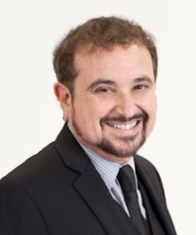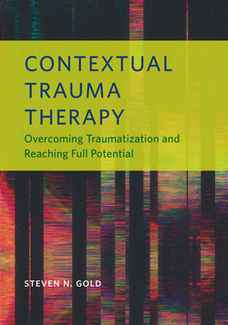New faculty book covers contextual trauma therapy
Therapy used by NSU clinic since 1990s
College of Psychology Professor Steven Gold’s new book, Contextual Trauma Therapy: Overcoming Traumatization and Reaching Full Potential, builds on decades of research and experience from an NSU clinic.
 Gold’s expertise includes working with adult survivors of prolonged childhood abuse (PCA), but the theoretical landscape of psychology was quite different in the early 1980s, compared to now. PTSD was a new addition to the Diagnostic and Statistical Manual of Mental Disorders, or DSM, but Gold found that his PCA clients were experiencing multiple issues, including negative self-image, difficulties in interpersonal relationships, and difficulty modulating emotional reactions and impulses. This is known as complex PTSD, or C-PTSD.
Gold’s expertise includes working with adult survivors of prolonged childhood abuse (PCA), but the theoretical landscape of psychology was quite different in the early 1980s, compared to now. PTSD was a new addition to the Diagnostic and Statistical Manual of Mental Disorders, or DSM, but Gold found that his PCA clients were experiencing multiple issues, including negative self-image, difficulties in interpersonal relationships, and difficulty modulating emotional reactions and impulses. This is known as complex PTSD, or C-PTSD.
“It’s a broader set of difficulties often that interfere on a much broader level with general functioning,” Gold said. “The idea has been that in contrast to PTSD which can result from a single traumatic event, people with C-PTSD develop those difficulties as a result of repeated traumatic events.”
 In 1990, Gold founded NSU’s Trauma Integration and Resolution Program, or TRIP. In working with clients at the clinic, Gold said it became apparent that the standard PTSD treatment of facing the trauma did not work for clients experiencing C-PTSD. Some clients dropped out of therapy or developed additional issues. However, Gold and his staff found that assisting clients in developing the capability for general functioning helped them process trauma.
In 1990, Gold founded NSU’s Trauma Integration and Resolution Program, or TRIP. In working with clients at the clinic, Gold said it became apparent that the standard PTSD treatment of facing the trauma did not work for clients experiencing C-PTSD. Some clients dropped out of therapy or developed additional issues. However, Gold and his staff found that assisting clients in developing the capability for general functioning helped them process trauma.
Twenty years ago, Gold wrote a book about child abuse survivors titled Not Trauma Alone: Therapy for Child Abuse Survivors in Family and Social Context. Gold said the book’s ideas differed from the conventional thinking of the time, but research over the last two decades has more clearly delineated what C-PTSD is.
“It’s been tremendously exciting to see the research validating and confirming the conclusions that we came to 20 years ago and more based on our work with clients, observation of clients, and some of our own work,” Gold said.
Gold is hopeful that the research at NSU and elsewhere will lead to more therapists receiving training on C-PTSD.